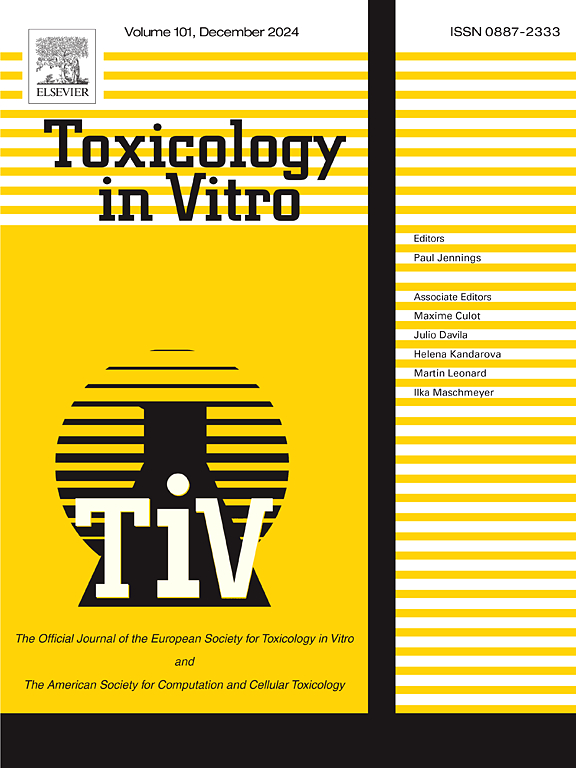一种新的3D表皮模型的验证,用于SENS-IS测定,以评估化学物质的皮肤致敏效力
IF 2.6
3区 医学
Q3 TOXICOLOGY
引用次数: 0
摘要
评估皮肤致敏的体外方法正在作为动物试验的道德替代品而发展。基于基因组分析的SENS-IS分析依赖于3D重建人类表皮(RHE)等强大的生物模型。Episkin的Rhe模型通常用于进行SENS-IS检测。本研究验证了Skin+模型在SENS-IS试验中可替代已建立的Episkin模型。我们测试了19种熟练化学品,按人类和LLNA效力分类,并比较了Skin+和Episkin的结果。Skin+模型显示出超过93%的批内和批间重现性,与Episkin的性能密切匹配。此外,屏障功能测试和基因表达分析证实了Skin+模型对SLS、TNBS和DMSO治疗反应的一致性。Skin+模型被证明是EpiSkin模型的可靠和可重复的替代品,保持强大的屏障完整性并提供类似的致敏预测。这一验证拓宽了实验室和行业寻求多功能3D RHE模型的选择,用于体外皮肤致敏测试,支持向更道德和更精确的方法过渡。本文章由计算机程序翻译,如有差异,请以英文原文为准。
Validation of a new 3D epidermis model for the SENS-IS assay to evaluate skin sensitization potency of chemicals
In vitro methods for evaluating skin sensitization are advancing as ethical alternatives to animal testing. The SENS-IS assay, based on genomic profiling, relies on robust biological models like 3D reconstructed human epidermis (RHE). The Rhe model from Episkin was typically used to performed the SENS-IS assay. This study validates the Skin+ model as an alternative to the established Episkin model in the SENS-IS assay.
We tested 19 proficiency chemicals categorized by human and LLNA potency and compared results between Skin+ and Episkin. The Skin+ model demonstrated over 93 % intra- and inter-batch reproducibility, closely matching Episkin's performance. Additionally, barrier function tests and gene expression analyses confirmed the consistency of the Skin+ model in response to SLS, TNBS, and DMSO treatments.
The Skin+ model proved to be a reliable and reproducible alternative to the EpiSkin model, maintaining strong barrier integrity and delivering comparable sensitization predictions. This validation broadens the options for laboratories and industries seeking versatile 3D RHE models for in vitro skin sensitization testing, supporting the transition to more ethical and precise methods.
求助全文
通过发布文献求助,成功后即可免费获取论文全文。
去求助
来源期刊

Toxicology in Vitro
医学-毒理学
CiteScore
6.50
自引率
3.10%
发文量
181
审稿时长
65 days
期刊介绍:
Toxicology in Vitro publishes original research papers and reviews on the application and use of in vitro systems for assessing or predicting the toxic effects of chemicals and elucidating their mechanisms of action. These in vitro techniques include utilizing cell or tissue cultures, isolated cells, tissue slices, subcellular fractions, transgenic cell cultures, and cells from transgenic organisms, as well as in silico modelling. The Journal will focus on investigations that involve the development and validation of new in vitro methods, e.g. for prediction of toxic effects based on traditional and in silico modelling; on the use of methods in high-throughput toxicology and pharmacology; elucidation of mechanisms of toxic action; the application of genomics, transcriptomics and proteomics in toxicology, as well as on comparative studies that characterise the relationship between in vitro and in vivo findings. The Journal strongly encourages the submission of manuscripts that focus on the development of in vitro methods, their practical applications and regulatory use (e.g. in the areas of food components cosmetics, pharmaceuticals, pesticides, and industrial chemicals). Toxicology in Vitro discourages papers that record reporting on toxicological effects from materials, such as plant extracts or herbal medicines, that have not been chemically characterized.
 求助内容:
求助内容: 应助结果提醒方式:
应助结果提醒方式:


